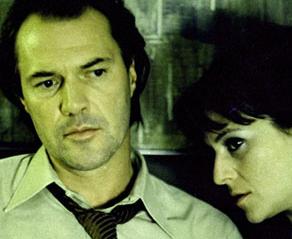| The
credo of the Stasi was simple: “To Know Everything.”
And Captain Gerd Wiesler of the East German Secret Police
prides himself on a painstaking devotion to that task. A romantic
idealist to the end, Wiesler (Ulriche Muhe) is the centerpiece
of first time German
director Florian Henckel von Donnersmarck’s Oscar-winning
The Lives of Others, a view from inside the former
GDR through the eyes of one of its apparatchiks. In
this East Germany, single-minded obedience is all that is
required—yet loneliness, humor and love manage to bubble
up and wreak havoc on even this seamless system of control. German
director Florian Henckel von Donnersmarck’s Oscar-winning
The Lives of Others, a view from inside the former
GDR through the eyes of one of its apparatchiks. In
this East Germany, single-minded obedience is all that is
required—yet loneliness, humor and love manage to bubble
up and wreak havoc on even this seamless system of control.
Lives
is set in East Berlin’s theatrical milieu peopled by
the likes of playwright Georg Dreyman (Sebastian Koch) and
his beautiful actress girlfriend Christa-Maria Sieland (Martina
Gedeck). Georg and Christa-Maria exist in a social order that
is almost bearable, if only they could completely brush aside
the stultifying limits of state control under which they must
live. Dreyman’s crowd is pure and single-minded, like
children; they only want to serve the higher cause of art.
They write and act in popular plays; they throw parties and
read Western books; even socialist officials like them.
Outside
their cocoon, though, the GDR grinds away, funneling every
technical and human talent on hand into one enterprise, surveillance.
And what experts they are—Wiesler proudly announces
his team can completely wire an apartment house in 20 minutes.
Dreyman’s precarious paradise begins to unravel when
Lt. Col. Anton Grubitz sees him as a golden opportunity to
curry favor with a superior who suspects Dreyman of . . .
well, nothing specific -- yet Grubitz cannily suggests they
initiate surveillance and knows just the man to do it: the
cool master operative Wiesler. However, day after day, as
Wiesler watches and listens to these “suspects,”
he sees a more tawdry and partisan story unfold: the minister’s
lust for Christa-Maria, Grubitz’s grubby politicking,
and Dreyman’s likeability. Slowly, imperceptibly, something
in him changes.
Indeed,
Lives might also serve as a meditation on the transformative
power of art itself. The director touches on this
theme throughout: the notion of Wiesler as audience to the
drama of these other lives; Georg’s musing about the
power of a beautiful concerto entitled The Sonata of a
Good Man, and later seeing watching the betrayals and
redemptions play out against his compassionate philosophy.
Lives
proves a much-needed and welcome addition to add to the usual
movie fare of escape plots and resistance seen from a Western
vantage point. von Donnersmarck artfully draws on his own
experience of this once closed society to create complex characters,
so we identify even more with Georg and Christa-Maria’s—and
even Wiesler’s—moral dilemmas.
The
film begins aptly in 1984 and ends after the Berlin Wall tumbles
down in 1989, a window into a Germany once closed to our view.
More than a political thriller or polemic, though, The
Lives of Others is a human and universal story—and
a cautionary tale about the all too human will to know, and
control, everything.
--
Patricia Ducey
 |



